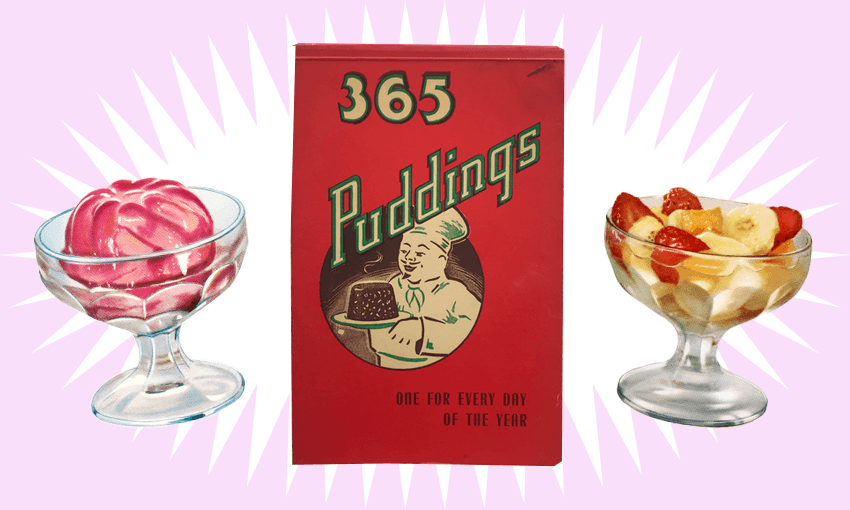Orange snow, Paradise pie… how a dusty bookshop find opened Charlotte Muru-Lanning’s eyes to Aotearoa’s impressive pudding history.
This is an excerpt from our weekly food newsletter, The Boil Up.
In most circumstances, I’d be put off by a book locked away inside one of those wooden and glass display cases you find in secondhand bookshops. While it’s understandable that they’re kept safe from sweaty hands and sticky fingers, any curiosity I have about them is usually overcome by fear of bothering the bookseller. And so those books stay put, and I go home with a tinge of regret.
Recently though, I braved the unlocking and ended up with a very special copy of 365 Puddings: One for every day of the year, a book that’s more than 80 years old. Published by Whitcombe and Tombs, it’s a unique tome, with a calendar-style format and a charming red, green and brown screen-printed cover. Established in Christchurch in 1882, Whitcombe and Tombs was once one of New Zealand’s largest and most preeminent booksellers and publishers. It later became Whitcoulls.
As is common with cookbooks of the period, 365 Puddings offers a frustrating lack of context, like when the book was published (an online source estimates 1941) or where the recipes came from (other than that they were “compiled by a New Zealand housewife”, who otherwise remains anonymous). In some ways, that only adds to the mystique.
Last year, around this time, I wrote about pudding. And I still firmly believe what I wrote back then, that “pudding in a bowl is one of those quintessential summer festive foods – chilled, aesthetically pleasing, nostalgic and perfect for sharing,” and also “you don’t need to wait till Christmas day to make one”.
And 365 Puddings does as it promises, suggesting seasonally appropriate puddings for each day in the calendar year, with of course special attention given to the Christmas period. Some of the suggestions seem curious: tomato pudding, macaroni custard, cabinet pudding, potato pie. Others are magnificently named: orange snow, snow white pudding, paradise pie. Needless to say, I’ll be quite literally whipping up some of these as soon as I can.
The most valuable element of this book, though, is the way it offers a glimpse into the expectations of puddings past.
My enthusiasm for puddings absolutely goes beyond the normal, and it’s not just because I appreciate a bountiful kitschy dessert. It’s because the transformation of puddings over time is a fascinating reflection of social and economic evolutions.
There’s evidence, for example, if you trace cookbooks of the last century, of a decline in hot, steamed and boiled puddings since the 1950s, which seemingly lost the popularity contest to the chilled variety – think trifles, creams and snows – after the advent of cheap home freezers. Suet fell out of fashion, in favour of butter. And then later on, as bulk-ice cream and ready-made pies and cakes were popularised, pudding-eating altogether declined.
In her book From Kai to Kiwi Kitchen, food anthropologist Helen Leach writes of the undisputed British influence on the New Zealand pudding, a category denoting a boiled or steamed dish, often containing starch, fat, egg, spices and dried fruit. American trends brought fanciful cold additions like Baked Alaska and Lemon Chiffon Pie. These expanded the definition of “pudding”, and later helped popularise “dessert” – to the dismay of the British – as the name of the course in which puddings of all types could be eaten. Or take the history surrounding the traditional puddings of Polynesia, including Aotearoa, which were imbued with mana and a sense of luxury.
Is it any wonder I’m so enchanted by the wonderful world of puddings?





